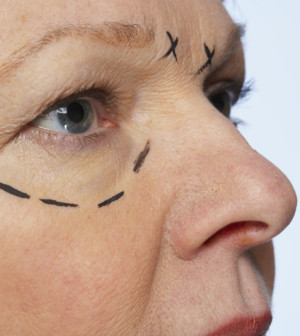- 8 Ways to Increase Dopamine Naturally
- 7 Best Breads for Maintaining Stable Blood Sugar
- Gelatin vs. Collagen: Which is Best for Skin, Nails, and Joints?
- The Long-Term Effects of Daily Turmeric Supplements on Liver Health
- Could Your Grocery Store Meat Be Causing Recurring UTIs?
- Are You Making This Expensive Thermostat Error This Winter?
- Recognizing the Signs of Hypothyroidism
- 10 Strategies to Overcome Insomnia
- Could Artificial Sweeteners Be Aging the Brain Faster?
- Techniques for Soothing Your Nervous System
Botox Might Prevent Irregular Heartbeat After Bypass Surgery

Botox isn’t just for crow’s feet anymore. The injectable wrinkle concealer may also help prevent development of an irregular heart rhythm after bypass surgery, new research suggests.
Atrial fibrillation, or a-fib, as the abnormal heartbeat is sometimes called, can lead to serious problems, including kidney damage, stroke or death.
“A few hundred thousand patients undergo heart surgery every year, and a-fib is very common, occurring in about 30 percent,” said Dr. Jonathan Steinberg, director of the Arrhythmia Institute of Valley Health System in Ridgewood, N.J.
Botox is the brand name of a toxin made from the bacterium Clostridium botulinum. Although best known for temporarily reducing the appearance of facial wrinkles, the drug has also been used to treat migraine headaches, overactive bladder and excessive sweating, among other conditions. It works by blocking nerve signals that tell muscles to contract.
For this study, 60 bypass patients were randomly chosen to receive either Botox or saline injections. All had had at least two episodes of heartbeat irregularity before the cardiac surgery and were considered at high risk of new episodes. None were currently taking atrial fibrillation medications.
The injections were delivered into the major fat pads around the heart during surgery, according to the report.
In the first 30 days after surgery, 7 percent of those who got the Botox developed atrial fibrillation compared to 30 percent of those given saline, the investigators found. One year after surgery, none of those who got Botox had the rhythm problem, versus 27 percent of those given saline.
Complications from surgery were similar in both groups. The Botox recipients reported no drug-specific complications, the researchers reported.
Steinberg said one injection would probably be enough. “Atrial fibrillation that occurs after cardiac surgery is a short-term problem, that is, about one week, so a single injection should be sufficient,” he said.
However, Steinberg stressed that the small study was conducted in two Russian hospitals and must be replicated in bigger trials. The results were published Oct. 20 in the journal Circulation: Arrhythmia and Electrophysiology.
The technique might eventually help other patients whose atrial fibrillation is unrelated to surgery, Steinberg said.
In the patients studied, Botox “appears to be very effective,” said Dr. Manish Shah, a cardiac electrophysiologist at MedStar Heart & Vascular Institute in Washington, D.C.
However, “this is not going to be a major treatment strategy for patients who have a-fib that we see most commonly,” said Shah, who was not involved in the study.
More information
To learn more about atrial fibrillation, visit the American Heart Association.
Source: HealthDay
Copyright © 2026 HealthDay. All rights reserved.










